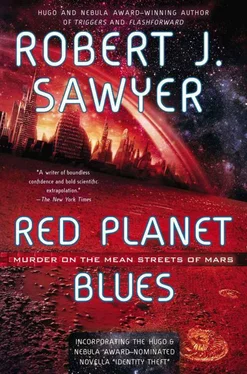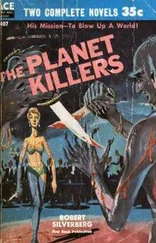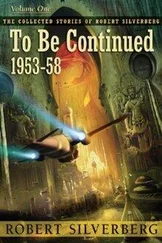Weingarten and O’Reilly never said precisely where they’d found their specimens, but it had been easy enough to prove that their first spaceship had landed here, in the Isidis Planitia basin. Other treasure hunters started coming, and Howard Slapcoff—the billionaire founder of the company that pioneered the process by which minds could be scanned and uploaded—had used a hunk of his fortune to create our domed city. Many of those who’d found good specimens in the early days had bought property in New Klondike from him. It had been a wonderful investment for Slapcoff: the land sales brought him more than triple what he’d spent erecting the dome, and he’d been collecting a life-support tax from residents ever since. Well, from the biological residents, at least, but Slappy got a fat royalty from NewYou each time his transfer process was used, so he lined his pockets either way.
Native life was never widely dispersed on Mars; the single ecosystem that had existed here seemed to have been confined to this basin. Some of the other prospectors—excuse me, fossil hunters—who came shortly after W&O’s first expedition found a few excellent specimens, although most of the finds had been in poor shape.
Somewhere, though, was the mother lode: a bed known as the “Alpha Deposit” that produced fossils more finely preserved than even those from Earth’s Burgess Shale. Weingarten and O’Reilly had known where it was—they’d stumbled on it by pure dumb luck, apparently. But they’d both been killed when their heat shield separated from their ship upon re-entry into Earth’s atmosphere after their third expedition—and, in the twenty mears since, no one had yet rediscovered it. But people were still looking.
There’d always been a market for transferring consciousness; the potentially infinite lifespan was hugely appealing. But here on Mars, the demand was particularly brisk, since artificial bodies could spend weeks or even months on the surface, searching for paleontological gold.
Anyway, Joshua-never-Josh Wilkins was clearly not outside the habitat and he hadn’t taken off in a spaceship. Wherever he was hiding, it was somewhere under the New Klondike dome. I can’t say he was breathing the same air I was, because he wasn’t breathing at all. But he was here, somewhere. All I had to do was find him.
I didn’t want to duplicate the efforts of the police, although “efforts” was usually too generous a term to apply to the work of the local constabulary; “cursory attempts” probably was closer to the truth, if I knew Mac.
New Klondike had twelve radial roadways, cutting across the nine concentric rings of buildings under the dome. The rings were evenly spaced, except for the giant gap between the seventh and eighth, which accommodated agricultural fields, the shipyard, warehouses, water-treatment and air-processing facilities, and more. My office was at dome’s edge, on the outside of the Ninth Circle; I could have taken a hovertram into the center but I preferred to walk. A good detective knew what was happening on the streets, and the hovertrams, dilapidated though they were, sped by too fast for that.
When I’d first come here, I’d quipped that New Klondike wasn’t a hellhole—it wasn’t far enough gone for that. “More of a heckhole,” I’d said. But that had been ten years ago, just after what had happened with Wanda, and if something in the middle of a vast plain could be said to be going downhill, New Klondike was it. The fused-regolith streets were cracked, buildings—and not just the ones in the old shantytown—were in disrepair, and the seedy bars and brothels were full of thugs and con artists, the destitute and the dejected. As a character in one of the old movies I like had said of a town, “You will never find a more wretched hive of scum and villainy.” New Klondike should have a sign by one of the airlocks that proclaims, “Twinned with Mos Eisley, Tatooine.”
I didn’t make any bones about staring at the transfers I saw along the way. They ranged in style from really sophisticated models, like Cassandra Wilkins, to things only a step up from the Tin Woodman of Oz. The latter were easy to identify as transfers, but the former could sometimes pass for biologicals, although you develop a knack for identifying them, too, almost subconsciously noting an odd sheen to the plastiskin or an unnatural smoothness in the movement of the limbs; paydar, it was called: the ability to spot a bought body.
Of course, those who’d contented themselves with second-rate synthetic forms doubtless believed they’d trade up when they eventually happened upon some decent specimens. Poor saps; no one had found truly spectacular remains for mears, and lots of people were giving up and going back to Earth, if they could afford the passage, or were settling in to lives of, as Thoreau would have it, quiet desperation, their dreams as dead as the fossils they’d never found.
I continued walking easily along; Mars gravity is just thirty-eight percent of Earth’s. Some people were stuck here because they’d let their muscles atrophy; they’d never be able to hack a full gee again. Me, I was stuck here for other reasons—thank God Mars has no real government and so no extradition treaties. But I worked out more than most people did—at Gully’s Gym, over by the shipyard—and so still had strong legs; I could walk comfortably all day if I had to.
I passed a few spindly or squat robots—most of whom were dumb as posts, and none of whom were brighter than a four-year-old—running errands or engaged in the Sisyphean tasks of road and building repair.
The cop shop was a lopsided five-story structure—it could be that tall, this near the center of the dome—with chipped and cracked walls that had once been white but were now a grimy grayish pink. The front doors were clear alloquartz, same as the overhead dome, and they slid aside as I walked up to them. On the lobby’s right was a long red desk—as if we don’t see enough red on Mars—with a map showing the Isidis Planitia basin behind it; New Klondike was a big circle off to one side.
The NKPD consisted of eight cops, the junior ones of whom took turns playing desk sergeant. Today it was a flabby lowbrow named Huxley, whose blue uniform always seemed a size too small for him. “Hey, Hux,” I said, walking over. “Is Mac in?”
Huxley consulted a monitor then nodded. “Yeah, he’s in, but he don’t see just anyone.”
“I’m not just anyone, Hux. I’m the guy who picks up the pieces after you clowns bungle things.”
Huxley frowned, trying to think of a rejoinder. “Yeah, well…” he said, at last.
“Oooh,” I said. “Good one, Hux! Way to put me in my place.”
He narrowed his eyes. “You ain’t as funny as you think you are, Lomax.”
“Of course I’m not. Nobody could be that funny.” I nodded at the secured inner door. “Going to buzz me through?”
“Only to be rid of you,” said Huxley. So pleased was he with the wit of this remark that he repeated it: “Only to be rid of you.” He reached below the counter, and the inner door—an unmarked black panel—slid aside. I pantomimed tipping a hat at Hux and headed into the station proper. I then walked down the corridor to McCrae’s office; the door was open, so I rapped my knuckles against the steel jamb.
“Lomax!” he said, looking up. “Decided to turn yourself in?”
“Very funny, Mac. You and Hux should go on the road together.”
He snorted. “What can I do for you, Alex?”
Mac was a skinny biological with shaggy orange eyebrows shielding his blue eyes. On the credenza behind his desk were holograms of his wife and his baby daughter; the girl had been born just a couple of months ago. “I’m looking for a guy named Joshua Wilkins.”
Читать дальше










